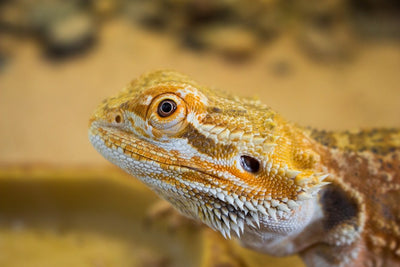Welcome to the World of Proper Crested Gecko Care!

Whether you're a new owner or looking to enhance your gecko care knowledge, these 10 tips will guide you through the essentials of providing a healthy and enriching environment for your crested gecko. From habitat setup to diet and handling, this comprehensive guide will equip you with the knowledge and skills to ensure your crested gecko thrives in captivity. Let's dive in and discover the key principles of proper crested gecko care!.
Crested Geckos: Housing Conditions
Crested geckos require specific housing conditions to thrive. It's important to monitor temperature gauges to prevent overheating, as they get stressed at higher temperatures. A low-wattage red nighttime bulb can serve as a heat source and also allows for nighttime viewing. It's crucial to maintain a moderate to high humidity level of about 50–70% and provide humidity through regular misting with warm, filtered water. When selecting a substrate, consider pet safety, ease of cleaning, and its ability to retain humidity. Suitable substrates include coconut fiber bedding, moss, or peat. Avoid gravel, reptile sand, and non-organic soil substrates. Depending on the cage setup, misting may be required a few times a day to maintain humidity. Additionally, it's essential to provide a daytime temperature gradient of 72–80 degrees Fahrenheit and 65–75 degrees Fahrenheit at night. Enclosures should be tall to accommodate their arboreal nature, and it's recommended to incorporate branches, vines, and ledges for climbing. Proper ventilation and a substrate that retains moisture well, such as cypress mulch, are also important. Crested geckos do not require UVB lighting but benefit from a light cycle that mimics natural day-night patterns. It's crucial to monitor temperature and humidity levels closely to ensure the health of your crested gecko.
Feeding
Crested geckos are omnivores, feeding on a varied diet of insects, fruit, and commercial crested gecko diet. Offer a balanced diet consisting of gut-loaded insects such as crickets, mealworms, androaches, along with fresh fruit purees and commercial crested gecko food. Feed juvenile geckos daily and adult geckos every other day. Ensure food items are appropriately sized to prevent choking hazards. Dust feeder insects with calcium and vitamin supplements if you're not feeding a diet already containing those vitamins to prevent nutritional deficiencies, particularly calcium metabolism disorders like metabolic bone disease. Provide a small shallow water dish with fresh water daily, though they will likely prefer to drink water droplets from leaves in the humid habitat. Because they are nocturnal, crested geckos eat in the evening.
Feed juveniles daily and adults three times a week. Crested geckos will usually eat a commercial diet, and it's the easiest way to ensure a well-balanced, nutritious diet. Supplement that food with crickets and other prey insects (roaches, waxworms, silkworms). Crested geckos shouldn't eat mealworms because they have a hard, undigestible exoskeleton. For variety and to allow the gecko to exercise his hunting instincts, feed as many prey insects at one time as the gecko will eagerly. Crested geckos will eat fruit several times a week. Favorites include bananas, peaches, nectarines, apricots, papaya, mangoes, pears, and passion fruit. The insects should be slightly smaller than the space between the gecko's eyes and should be gut-loaded (fed nutritious foods) before feeding to your lizard. To boost your reptile's vitamin and mineral intake, dust the insects with a calcium/vitamin D3 powdered supplement three times a week. You can dust prey items with a multivitamin powder supplement once a week as well. If you have difficulty finding a commercial gecko diet, provide a combination of insect prey items and fruit. This option is not the most balanced diet, but it will suffice for a short period. In this case, your best insect choice is crickets with the occasional addition of other insects for variety.
Handling and Interaction
When taking care of a crested gecko, it's important to understand how to handle and interact with these unique creatures. Crested geckos require daily maintenance, but their care is relatively quick and easy. It's essential to keep their enclosure humid and clean, and ensure they are well-fed. In return, they will reward you with adorable eyeball licks and clumsy jumps, making them wonderful pets.
One crucial aspect of interaction is handling. It's important to be consistent with your handling and allow the gecko to walk hand to hand without trying to restrain it. This helps to minimize stress for the gecko. When handling them, it's advisable to be seated to prevent them from falling far if they jump. Additionally, it's important not to pick them up by the tail, as this can lead to issues. Crested geckos are known for their climbing abilities and agility, making them fascinating pets for both children and novice lizard owners.
For those considering adding a crested gecko to their family, it's essential to explore comprehensive care guides to ensure their well-being and happiness.
Health and Wellness
When it comes to the health and wellness of crested geckos, it's important to be aware of common issues and how to address them. Geckos are generally low-maintenance pets, but they are prone to a few health problems that may require attention from an exotic pet veterinarian. It's essential to monitor your crested gecko's health and behavior regularly for any signs of illness or distress.
Some common health issues in crested geckos include respiratory infections, parasites, and shedding problems. If you notice any abnormalities or concerns, it's advisable to consult a reptile veterinarian experienced in treating crested geckos. Remember to always do your own research and consult with a veterinarian who specializes in reptiles if you have any concerns about your crested gecko's health.
Additionally, it's important to provide a suitable environment, proper diet, and regular care to ensure the well-being of your crested gecko. By staying informed and proactive, you can help your gecko live a healthy and happy life.
Proper care for crested geckos is essential for their health and well-being. By following the 10 tips outlined in this blog, you can ensure that your crested gecko thrives in its environment. Remember to provide a suitable habitat, proper diet, and regular health check-ups to keep your pet happy and healthy.
For a comprehensive range of products and supplies for reptile and amphibian care, including habitats, ornaments, and food options, visit. Zilla Micro Reptile and Amphibian Habitats Arboreal For high-quality options that cater to the specific needs of your pets.






